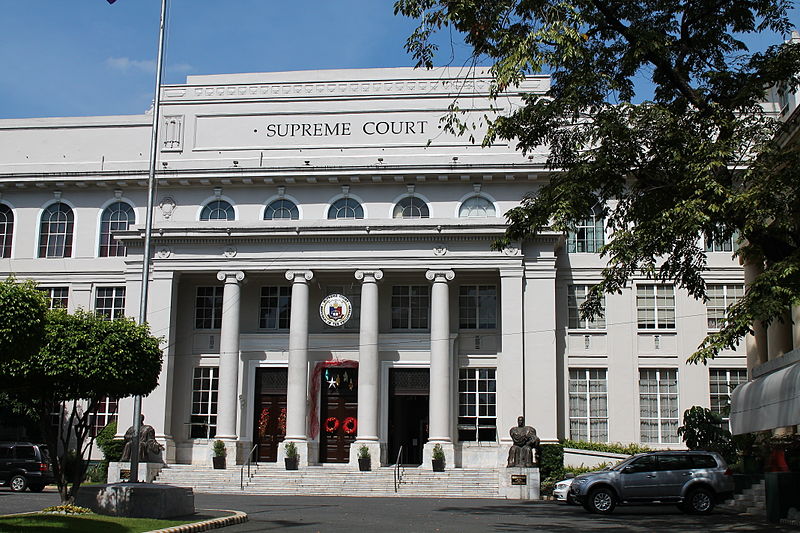News
SC affirms indictment of Legacy bank owners, cohorts for estafa

“The June 3, 2016 Resolution of the Department of Justice, through then Secretary of Justice Emmanuel L. Caparas, in NPS Docket No. XVI-INV-12K-00480 finding probable cause to charge respondent Manu Gidwani for estafa through falsification under Art. 315(2)(a) in relation to Art. 172(1) and 171(4) of the RPC in the amount of P97,733,690.21, and for money laundering as defined in Section 4(a) of RA 9160 is hereby reinstated,” read the High Court’s ruling and concurred by Associate Justices Marvic Leonen, Samuel Martires, and Alexander Gesmundo. (PNA photo)
MANILA — The Supreme Court (SC) upheld the decision of the Department of Justice (DOJ) indicting the owners and depositors of Legacy Banks and a branch manager of the Rizal Commercial Banking Corp. (RCBC) for duping the government through fraudulent deposit insurance claims amounting to PHP97.73 million.
In an 18-page decision dated June 20, penned by Associate Justice Presbitero Velasco Jr.
, the SC Third Division reinstated the resolution issued by then justice secretary Emmanuel Caparas dated June 3, 2016, which found probable cause to charge spouses Manu and Champa Gidwani, RCBC Bacolod Main branch manager Andrew A. Jereza and 86 others for estafa through falsification of documents, perjury, and money laundering.
“The June 3, 2016 Resolution of the Department of Justice, through then Secretary of Justice Emmanuel L. Caparas, in NPS Docket No. XVI-INV-12K-00480 finding probable cause to charge respondent Manu Gidwani for estafa through falsification under Art. 315(2)(a) in relation to Art. 172(1) and 171(4) of the RPC in the amount of P97,733,690.21, and for money laundering as defined in Section 4(a) of RA 9160 is hereby reinstated,” read the High Court’s ruling and concurred by Associate Justices Marvic Leonen, Samuel Martires, and Alexander Gesmundo.
In 2008, the Monetary Board of the Bangko Sentral ng Pilipinas (BSP) ordered the closure of 13 rural banks controlled by the Legacy Group of Companies (Legacy Banks) and placed them under receivership of the Philippine Deposit Insurance Corp. (PDIC).
The Gidwanis, together with 86 other individuals, represented themselves to be owners of 471 deposit accounts with Legacy Banks and filed claims before the PDIC.
The claims were processed and granted, resulting in the issuance of 683 Land Bank of the Philippines (LandBank) checks with a total face value of PHP98.73 million in favor of the 86 individuals.
Despite the fact that the checks issued were “payable to the payee” account only, the said individuals did not deposit these in their respective bank accounts.
Instead, the checks were credited to a single RCBC account owned by the Gidwanis, allegedly in connivance with Jereza.
The PDIC discovered the anomaly when the checks were cleared and returned to it.
Caparas ruled that had the depositors truthfully divulged to PDIC that the true and beneficial owner of the bank accounts was Manu, PDIC would not have been duped into treating the bank accounts individually and separately.
He said the PDIC would have only paid the Gidwani spouses PHP250,000 as the maximum deposit coverage pursuant to Section 4 (g) of the PDIC Charter, and not PHP98.73 million.
Caparas ruled that the heavy influx of deposits to the Gidwani spouses’ account should have already prompted RCBC and Jereza to file a suspicious transaction report with the Anti-Money Laundering Council (AMLC).
In upholding Caparas’ resolution, the SC held that the former justice secretary “has the power and discretion” to assess the documents and pleadings submitted to him for review and come up with his own finding.
“He is not bound by the rulings of his predecessors because there is yet to be a final resolution of the issue; the matter is still pending before his officer after all. To hold otherwise would render the filing of the motion a futile exercise, and the recourse, pointless,” read the court ruling.
“It was therefore plain error on the part of the CA to have ruled that SOJ (Secretary of Justice) Caparas virtually had no option but to affirm the findings of the DOJ Task Force and of SOJ Justiniano as to the alleged absence of probable cause to charge respondent,” it added.
The High Tribunal set aside the Jan. 31, 2017 decision of the Court of Appeals (CA), which reversed Caparas’ resolution and ordered the dismissal of the complaint.
In the decision, the appellate court did not give merit to the allegations of the petitioner, the PDIC, because of its failure to prove that Manu is the owner of all the accounts subject of the complaint.
However, the SC ruled that the CA erred in holding that Caparas gravely abused his discretion in reversing an earlier resolution issued by then justice undersecretary Jose Justiniano, which upheld the DOJ Task Force’s recommendation to dismiss the complaint against the respondents.
It indicated that the CA prematurely ordered the dismissal of the complaint, considering that it is still in the stage of preliminary investigation and has yet to be heard in a full-blown trial.
“Whether or not there indeed existed an agreement between respondent Manu and the individual depositors is a matter best left ventilated during trial proper, where evidence can be presented and appreciated fully. Suffice it to state for now that the Court herein finds probable cause to charge respondent for estafa and money laundering,” the SC declared.





















